Oct. 14, 2025
Conferences

🌐follow Marie-Anne Frison-Roche on LinkedIn
🌐subscribe to the Newsletter MAFR Regulation, Compliance, Law
🌐subscribe to the VideoNews MAFR Surplomb
🌐subscribe to the Newsletter MaFR Law & Art
____
► Full reference: M.-A. Frison-Roche, "Adéquation et inadéquation de la sanction comme outil de régulation financière et sa transformation par la Compliance" (Adequacy and inadequacy of sanctions as a tool of Financial Regulation and its transformation through Compliance)", contribution to the round-table discussion on"Quel rôle pour la sanction dans la régulation ? (What role for sanctions in Regulatory System)", Annual conference of the Commission des sanctions (Enforcement Committee) of the Autorité des marchés financiers - AMF (French Financial Markets Authority), Paris, 14 October 2025.
____
► see the general programme of this manifestation (in French)
The event comprises two round tables. The theme of the first round table is: La preuve des abus de marché entre l’AMF et le juge pénal : vers une convergence ? (Proof of market abuse between the AMF and the criminal courts: towards convergence?)
🪑🪑🪑AutresOther participants in this 2nd round table, moderated by Sophie Schiller, member of the Enforcement Committe on the topic: Quel rôle pour la sanction dans la régulation ? (What role for sanctions in Regulatory System?)
🕴🏻Sébastien Raspiller, Secretary General of the AMF
🕴🏻Martine Samuelian, Partner, Jeantet Law Firm
🕴🏻Vincent Villette, Secretary General of the CNIL (French Personal Data Regulatory Body)
____
► Summary of this intervention : In the round-table discussion on the role of sanctions, a number of contributions will be made, depending on the nature of the discussion itself. They will be brief in nature and will be aimed at an audience with a good knowledge of financial regulation.
It is the occasion for me to insist on 2 things, the first naturely and probably for ever attached to the role of sanctions in all Regulatory Systems, the secund very new. The first is the indissociability between Criminal Law and Sanction, even if sanctions is defined as a regulatory tools. The secund is the conception and the use of sanctions through Compliance Law.
Therefore, in the first idea, my first intervention, aimed more at establishing the subject and describing the Intangible, is on the very idea that sanctions have a role to play in financial regulation. By its very nature. But this does not make it any less difficult. It is not obvious, because if penalties are seen as a 'regulatory tool', then it is the regulatory perspective that predominates and 'colours' the tool that is the penalty. Regulation, of which the texts on the basis which sanctions are issued are only one tool and which is not the set of applicable rules, Regulation which is an apparatus of institutions, rules and decisions aimed at establishing the equilibrium of a sector and maintaining this equilibrium, which is by nature unstable, over time, which the sector could not do by its own efforts alone (Regulatory Law, which is Ex Ante Law, thus distinguishing itself from Competition Law, which is Ex Post Law).
From the perspective of Financial Regulatory System, as in other sectoral regulatory systems, and in the general Regulatory Law, sanctions are a tool (and a tool like any other, simply more powerful than the others.
This is the pragmatic perspective adopted by the State and the Regulatory body itself, which will use it in conjunction with other tools, such as an Information, Education and Incentive mechanism. Moreover, it shall use sanction as informative tool, as educational tool, as incentive tool.
However, the principle of the autonomy of Criminal Law, and the European concept of "Criminal Matters" mean that the sanction can be seen in terms of the autonomous criteria of the seriousness of the act imputed and the sanction imposed on the legal person. In this respect, the penalty is inseparable from the way in which it is imposed (Criminal Law is constitutionally inseparable from Criminal Procedure).
In this respect, the sanction is not a tool coloured by the overall objective served by the Financial Markets Regulatory Body: the sustainability of the financial system. The Enforcement Committee is not the AMF's "armed wing"; it is a "court", as the Oury ruling reminded us.
Therefore, the question is and I would like to ask it directly to the Enforcement Committed: Can you be both?

As they say, could you be both carp and rabbit? Depending on whether you are viewed from one angle or another, you will be seen as the body that makes financial markets effective (a tool among the tools) or as the body that punishes misconduct (a court among the courts).
It is possible, and in practice it is often true.
But if we are honest, we will admit that regulation feeds on information and that the procedure before a criminal court is built on secrecy and the weapons of those who, innocent or guilty, are at risk because they are, or will be, prosecuted.
We've never got out of this difficulty. We always try to strike a balance between the fact that it is in itself a repressive sanction for a person who will suffer and the fact that it is also a systemic tool: there is a 'balance' between the search for systemic benefit (which reduces the protection of individuals for the benefit of the system) and the concern for the people involved (which reduces the present and future protection of the system). The balance goes more or less in one direction. It is often public opinion, the place, the legislator and, even above all, the civil appeal judge (vertical dialogue) and those in dialogue, between the regulator and the criminal judge (horizontal dialogue) which cause the scales of diverse technical solutions.
It is also the way in which the Enforcement Committee, in defining itself as the armed wing of the AMF (carp) or as a repressive court (rabbit), chooses in its procedural behaviour the role of sanctions in Financial Regulatory System, more or less instrumentalised (carp) or jurisdictionalised (rabbit).
____
The second point, if there is to be one, concerns the development of the role of sanctions in Financial Regulatory System .
On the basis of these fundamentals, an evolution in the role of sanctions in financial regulatory system (an evolution that can be observed in all sectoral regulatory systems) consists of internalising sanctions (in their conception by the texts, their elaboration by the Sanctions Committees, their application) in the economic operators sanctioned, in the economic sectors concerned, in the opinion concerned (the figure of Peelmanian circles of the audiences applying).
This internalisation transforms Regulatory mission of the administrative body (which deals with market structures) into Rupervision (which deals directly with market operators) since the sanction penetrates the operator, the operator adopting commitments. This concept corresponds to the new branch of Law known as Compliance Law.
Compliance Law uses sanctions as an "incentive like any other", and (we must be careful on this point), because it is systemic in nature, the concern for the system being internalised in the operator, it is relatively insensitive to procedural rights. With the emphasis on information, it is the principle of adversarial debate (which provides information) rather than the rights of the defence that is valued. The cooperation of the person being prosecuted is highly valued, and non-cooperation becomes incomprehensible.
The internalisation of sanctions by operators has led to two major changes. Firstly, these economic operators themselves must sanction, detect and prevent market abuse. The number of special obligations of vigilance is increasing. The obligation of vigilance of operators themselves is becoming a pillar of Regulation, transformed in Supervision.
The other development is the liberalisation of regulatory system in relation to territory, thank to Compliance Law. As operators are less dependent on borders than are regulators and authors of legal texts (but soft law is spreading, including repression), market abuses can be apprehended in several jurisdictions at the same time, notably through global compliance programmes.
________
Oct. 2, 2025
Publications

🌐follow Marie-Anne Frison-Roche on LinkedIn
🌐subscribe to the Newsletter MAFR Regulation, Compliance, Law
🌐subscribe to the Video Newsletter MAFR Surplomb
____
► Full Reference: M.-A. Frison-Roche, "Le droit processuel, prototype de l'Obligation de Compliance " ("General Procedural Law, prototype of Compliance Obligation"), in M.-A. Frison-Roche (ed.), L'Obligation de Compliance, Journal of Regulation & Compliance (JoRC) and Dalloz, coll. "Régulations & Compliance" 2025, pp. 209-233.
____
📝read the article (in French)
____
____
📕read a general presentation of the book, L'Obligation de Compliance, in which this article is published
____
► English summary of this contribution : At first glance, General Procedural Law seems to be the area the least concerned by the Compliance Obligation, because if the person is obliged by it, mainly large companies, it is precisely, thanks to this Ex Ante, in order to never to have to deal with proceedings, these path that leads to the Judge, that Ex Post figure that in return for the weight of the compliance obligation they have been promised they will never see: any prospect of proceedings would be seeming to signify the very failure of the Compliance Obligation (I).
But not only are the legal rules attached to the Procedure necessary because the Judge is involved, and increasingly so, in compliance mechanisms, but they are also rules of General Procedural Law and not a juxtaposition of civil procedure, criminal procedure, administrative procedure, etc., because the Compliance Obligation itself is not confined either to civil procedure or to criminal procedure, to administrative procedure, etc., which in practice gives primacy to what brings them all together: General Procedural Law (II).
In addition to what might be called the "negative" presence of General Procedural Law, there is also a positive reason, because General Procedural Law is the prototype for "Systemic Compliance Litigation", and in particular for the most advanced aspect of this, namely the duty of vigilance (III). In particular, it governs the actions that can be brought before the Courts (IV), and the principles around which proceedings are conducted, with an increased opposition between the adversarial principle, which marries the Compliance Obligation, since both reflect the principle of Information, and the rights of the defence, which do not necessarily serve them, a clash that will pose a procedural difficulty in principle (V).
Finally, and this "prototype" status is even more justified, because Compliance Law has given companies jurisdiction over the way in which they implement their legal Compliance Obligations, it is by respecting and relying on the principles of General Procedural Law that this must be done, in particular through not only sanctions but also internal investigations (VI).
________
Sept. 27, 2025
Newsletter MAFR - Law, Compliance, Regulation

🌐suivre Marie-Anne Frison-Roche sur LinkedIn
🌐s'abonner à la Newsletter MAFR Regulation, Compliance, Law
🌐s'abonner à la Newsletter en vidéo MAFR Surplomb
🌐s'abonner à la Newsletter MaFR Droit & Art
____
► Référence complète : M.-A. Frison-Roche, "Exerçant un pouvoir de sanction, le Régulateur doit informer la "personne concernée" de son droit de se taire (cons. const., 26 sept. 2025)", Newsletter MAFR Law, Compliance, Regulation, 27 septembre 2025
____
📧Lire par abonnement gratuit d'autres news de la Newsletter MAFR - Law, Compliance, Regulation
____
► Résumé de l'article : Le Conseil constitutionnel a rendu le 26 septembre 2025 une décision n°2025-1164 , Société Eurotitrisation et autres qui déclare une disposition du Code monétaire et financier contraire à la Constitution.
Le Conseil déclare, et cela ne surprend pas notamment parce qu'il enrichit une jurisprudence débutée en 2016 affirmant régulièrement le caractère constitutionnel et autonome du "droit de se taire", que le fait pour le CMF de ne pas contraindre la Commission des sanctions de l'Autorité des marchés financiers (AMF) à informer une personne concernée de son droit de se faire rend de ce meme fait le dispositif procédural organisé par ce texte (IV de l'art.L 621-15 CMF, qui ne formulait qu'en termes généraux l'obligation de respecter le principe du contradictoire et des droits de la défense, sans viser le droit de se taire) contraire à la Constitution.
Cette sanction, intègre donc la règle dans la loi française, car en censurant à effet immédiat un silence le Conseil injecte immédiatement le droit de se taire dans les procédues en cours devant la Commission des sanctions de l'AMF (I). La solution était prévisible et vaut pour toutes les Autorités de régulations (II). Mais elle montre les tensions entre l'exercice du pouvoir spécial de sanction, qui appelle le droit de se taire au profit des "personnes concernées" et le pouvoir général de régulation, dont la sanction n'est pourtant qu'un outil, régulation qui suppose l'obtention d'informations et supporte mal ce silence (III). Plus largement, c'est l'affrontement entre l'impératif des secrets et l'impératif de l'information qui se déroule (IV).
____
📧lire l'article publié le 27 septembre dans la Newsletter MAFR - Law, Compliance, Regulation
Sept. 15, 2025
Conferences

🌐follow Marie-Anne Frison-Roche on LinkedIn
🌐subscribe to the Newsletter MAFR Regulation, Compliance, Law
🌐subscribe to the Video Newsletter MAFR Surplomb
🌐subscribe to the Newsletter MaFR Droit & Art
____
► Full Reference: M.-A. Frison-Roche, "Compliance Law and Systemic Litigation", 15 September 2025, Madrid.
____
This speech is the opening speech of the event.
🧮 See the general program of the event
____
📅See the slides (not used), basis for this speechs
____
► Summary of the conference: This manifestation, made fo many interventions, is about the role and the evolution of the in-house lawyers in the Europe on the move. I opened the event by focusing on the importance of the Compliance which drives the companies now, in the future and for the future. It is quite difficile because currently Compliance Law is quite misunderstund by almost every. Therefore the first part of my intervention has been the explanation of what is the very new branch of Law, built of political Monumental Goals (Compliance Law is not just the obligation to be conform with, just to obey), the specificity of European Compliance Monumental Goals (not only the sustainability of systems, but also the concern for present and future human beins implied in them).
This systemic new branch of Law, humanist branch of Law in Europe put the Judge at its center.
Par translation, this is creating a new sort of Litigation : the Compliance Systemic Litigation. Its object is the future (as Compliance Law itselft).
Contrary to the "conformity", which might be left to algorithms, Compliance Law, inseparable to Systemic Litigation, are giving new role for Judges, for external lawyers and for internal lawyers.
________
June 19, 2025
Thesaurus : Autorité de Contrôle Prudentiel et de résolution (A.C.P.R.)
► Référence complète : ACPR, Comm. sanct., déc. n°2024-02, 19 juin 2025, Banque Delubac et Cie
____
_______

Updated: June 5, 2025 (Initial publication: June 20, 2024)
Publications

🌐follow Marie-Anne Frison-Roche on LinkedIn
🌐subscribe to the Newsletter MAFR Regulation, Compliance, Law
🌐subscribe to the Video Newsletter MAFR Surplomb
____
 ► Full Reference: M.-A. Frison-Roche, The will, the heart and the calculation, the three traits encercling the Compliance Obligation, March 2024.
► Full Reference: M.-A. Frison-Roche, The will, the heart and the calculation, the three traits encercling the Compliance Obligation, March 2024.
____
📝 This Working Paper is the basis for the contribution "The will, the heart and the calculation, the three traits encercling the Compliance Obligation", in📘Compliance Obligation.
____
► Summary of this Working Paper: There is often a dispute over the pertinent definition of Compliance Law, but the scale and force of the resulting obligation for the companies subject to it is clear. It remains difficult to define. First, we must not to be overwhelmed by the many obligations through which the Compliance Obligation takes shape, such as the obligation to map, to investigate, to be vigilant, to sanction, to educate, to collaborate, and so on. Not only this obligations list is very long, it is also open-ended, with companies themselves and judges adding to it as and when companies, sectors and cases require.
Nor should we be led astray by the distance that can be drawn between the contours of this Compliance Obligation, which can be as much a matter of will, a generous feeling for a close or distant other in space or time, or the result of a calculation. This plurality does not pose a problem if we do not concentrate all our efforts on distinguishing these secondary obligations from one another but on measuring what they are the implementation of, this Compliance Obligation which ensures that entities, companies, stakeholders and public authorities, contribute to achieving the Goals targeted by Compliance Law, Monumental Goals which give unity to the Compliance Obligation. Thus unified by the same spirit, the implementation of all these secondary obligations, which seem at once disparate, innumerable and often mechanical, find unity in their regime and the way in which Regulators and Judges must control, sanction and extend them, since the Compliance Obligation breathes a common spirit into them.
In the same way that the multiplicity of compliance techniques must not mask the uniqueness of the Compliance Obligation, the multiplicity of sources must not produce a similar screen. Indeed, the Legislator has often issued a prescription, an order with which companies must comply, Compliance then often being perceived as required obedience. But the company itself expresses a will that is autonomous from that of the Legislator, the vocabulary of self-regulation and/or ethics being used in this perspective, because it affirms that it devotes forces to taking into consideration the situation of others when it would not be compelled to do so, but that it does so nonetheless because it cares about them. However, the management of reputational risks and the value of bonds of trust, or a suspicious reading of managerial choices, lead us to say that all this is merely a calculation.
Thus, the contribution sets out to identify the Compliance Obligation by recognising the role of all these different sources. It emphasises that, in monitoring the proper performance of technical compliance obligations by Managers, Regulators and Judges, insofar as they implement the Compliance Obligation, it is pointless to limit oneself to a single source or to rank them abruptly in order of importance. The Compliance Obligation is part of the very definition of Compliance Law, built on the political ambition to achieve these Monumental Goals of preserving systems - banking, financial, energy, digital, etc. - in the future, so that human beings who cannot but depend on them are not crushed by them, or even benefit from them. This is the teleological yardstick by which the Compliance Obligation is measured, and with it all the secondary obligations that give it concrete form, whatever their source and whatever the reason why the initial standard was adopted.
In order to define Compliance's Obligation, the contribution endeavours to recognise the contribution of all these three sources: Will, Heart and Calculation.
_____
🔓read the developments below ⤵️
Feb. 12, 2025
Thesaurus : 02. Cour de cassation

► Référence complète : Com., 12 février 2025, n°23-20.079, M c/ société MDC
____
____
Description de l'arrêt.
Les statuts d'une SAS comprennent une clause d'exclusion d'associé, stipulation qui prévoit une notification préalable au moins 30 jours avant, donnant les motifs et la date de la réunion pour que l'associé puisse faire valoir ses arguments en défense.
En juin 2018, l'associé est convoqué, les motifs communiqués étant le fait qu'il travaillerait en même pour une entreprise concurrence, à une réunion préalable à laquelle il se ne rend pas.
A l'AG de la semaine suivante, l'associé est exclu.
Il attaque en nullité la délibération
Puis en 2019, la société est mise en redressement judiciaire puis liquidée, le litige se poursuivant donc entre l'associé et le liquidateur.
La Cour d' appel de Rouen donne satisfaction à l'associé en estimant que la notification adressée ne mentionnait que le fait de travailler depuis plusieurs années pour une entreprise concurrente ce qui est contraire aux obligations de l'associé, sans préciser ni l'identité de l'entreprise ni l'activité en question ne satisfaisait pas à la stipulation statutaire d'exclusion.
La Chambre commerciale prononce une cassation sur le fondement de l'article 1134 du Code civil selon lequel les conventions tiennent lieu de loi à ceux qui les ont faites. Elle relève en effet que la clause statutaire exige la notification des motifs mais pas de telles précisions.
____
Jan. 28, 2025
Conferences
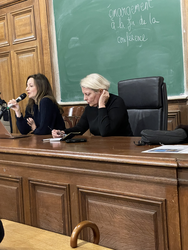
🌐suivre Marie-Anne Frison-Roche sur LinkedIn
🌐s'abonner à la Newsletter MAFR. Regulation, Compliance, Law
🌐s'abonner à la Newsletter Surplomb, par MAFR
____
► Référence complète : M.-A. Frison-Roche, "Juger une situation familiale, une "obligation impossible"", in Collège de Droit de l'Université Panthéon-Sorbonne (Paris I), Dialogue avec Éliette Abécassis autour de son roman Divorce à la française, Amphi Turgot, Sorbonne, 28 janvier 2025, 20h-21h30, Paris.
____
🪑🪑🪑Cette conférence a été ouverte par Philippe Stoffel-Munck, co-directeur du Collège de Droit de l'Université Panthéon-Sorbonne (Paris I), qui a présenté les parcours, travaux et personnalités d'Éliette Abécassis et de moi-même.
Puis, selon le principe du dialogue, Éliette Abécassis a présenté trois points d'un point de vue littéraire et philosophique sur lesquels elle m'a demandé d'exprimer ma perspective.
- Le premier point portait sur la procédure, les caractères contradictoires des discours des uns et des autres, la place de la vérité dans une procédure de divorce et la place de la vérité.
- Le deuxième point a porté sur la difficulté de juger, sur l'impossibilité même de juger, son roman étant construit pour mettre le lecteur dans la position qui est celle du juger : comment arriver à juger ?
- Le troisième point a porté sur le caractère "profondément humain" des divorces et du jugement de ceux-ci et, en conséquence, de ce qui donnerait l'application de ladite intelligence artificielle en la matière.
Selon la méthode convenue entre nous, n'ayant pas été prévenue du choix de ces perspectives-là mais connaissant bien Éliette Abécassis et son oeuvre, j'ai donc développé "sur le banc" les points suivants pour les articuler à l'auditoire composé d'étudiants en droit en 1ière, 2ième et 3ième année :
____
► Présentation de mes réponses aux questions ouvertes par Eliette Abécassis dans ce dialogue : 🔴Éliette a montré comment dans Divorce à la français, elle a fait parlé de multiples personnes impliquées dans la procédure de divorce qui font des récits contradictoires, proposant des vérités qui se contredisent, reprenant comme trame du roman la procédure elle-même. Les vérités multiples sont ainsi confrontées, notamment celle de la littérature et celle du Droit.
I. LE PRINCIPE DU CONTRADICTOIRE, LA VÉRITÉ, LES PARTIES ET LE JUGE
La procédure est effectivement gouvernée par le "principe du contradictoire". Pour les parties au litige, il ne s'agit pas particulièrement de participer à la recherche de la vérité : une partie dans un procès veut gagner, c'est-à-dire notamment que son adversaire perde. Le débat et son alimentation notamment en éléments de preuve a pour bénéficiaire principe le juge. D'ailleurs et à ce titre le principe du contradictoire se démarque des droits de la défense, en ce que ceux-ci n'ont pas toujours pour objectif la vérité mais sont des prérogatives, de plus haut niveau dont les personnes sont titulaires parce qu'elles sont en risque dans la perspective de la décision susceptible d'être prise. Elles peuvent ainsi se défendre, par exemple en mentant, ou en se taisant. Les autorités sont donc davantage favorables au contradictoire, principe qui fonctionne en leur faveur, qu'aux droits de la défense, droits subjectifs qui leur sont parfois opposées. Parce que le juge est gardien de l'État de droit, il concrétise le contradictoire mais aussi les droits de la défense. Parce que la vérité peut aussi être un argument, elle peut aussi alimenter défense et débat mais gardons en tête cette opposition de départ qui fonde le Droit processuel, que Divorce à la française illustre.
🔴Le deuxième point est sur la difficulté de juger. Éliette Abécassis souligne la difficulté de juger qui est d'autant plus pointée dans son roman que le juge est à la fois omniprésent qu'il est le seul à ne pas prendre la parole. C'est donc le lecteur qui est institué juge. Il perçoit lui-même à travers son expérience de lecteur la difficulté de juger, mais aussi l'importance de juger. Elle se réfère notamment notamment aux travaux de Paul Ricoeur sur l'enjeu du jugement et du juste.
II. LE DIFFICILE ART DE JUGER, OBLIGATION IMPOSSIBLE
Cela m'a fait penser à l'ouvrage publié avec un ami très cher qui étudia avec moi dans ce même Amphi Turgot la philosophie pour une licence de philosophie, ouvrage ayant pour titre La justice. L'obligation impossible. Il est "impossible" de juger, parce qu'il est "impossible" d'être juste.
Faut-il donc se détourner de cet office-là ? De cette prétention-là ? Non, car si la justice, comme la vérité, est un point que nul ne peut atteindre, alors que la Justice est une vertu qui contient toutes les autres et en cela si nous ne sommes pas justes nous n'avons plus aucune vertu (par exemple la vertu du courage), il convient (comme le fait tout juge) partir des situations.
Les situations sont injustes. Etre juste, c'est d'abord être sensible, être perspicace à l'intensité d'injustice de telle ou telle situation. C'est déjà ça. Puis, c'est agir. C'est-à-dire la dire, ce qui est déjà un premier jugement. Puis la trancher, la réparer, la consoler. C'est ainsi que l'on peut être juste. C'est sans doute pour cela que l'on devient juge. Notamment lorsqu'il s'agit des situations familiales.
🔴Éliette insiste sur la violence des conflits qui s'exprime aussi dans les procédures de divorce et que son roman met en scène. Cette instabilité des rapports humains correspond à une société qui est en train de "liquéfier" les rapports entres les êtres humains, et bientôt les êtres humains eux-mêmes. Elle s'inquiète de ce que va produire sur la justice humaine l'usage de l'intelligence artificielle.
III. LES ALGORITHMES, APPUI OU DESTRUCTION DE L'OFFICE DU JUGE
Le troisième point porte donc sur la pertinence, légitimité et efficacité de l'usage des algorithmes dans les contentieux de divorce. Il est tentant de répondre en bloc que le système algorithmique sans âme ne doit pas toucher ce contentieux-là car pour reprendre les mots d'Eliette Abécassis, il est "profondément humain" et donc seul un juge humain peut y toucher. Mais il faut aussi considérer que la procédure, dont on a montré tout à l'heure la dimension humaniste à travers le contradictoire et les droits de la défense, est une machinerie, avec des délais et des séries d'actes de procédure que des algorithmes aident à mener et à contrôler.
La procédure c'est par nature du temps, et plus exactement de la durée, du temps qui passe. Il faut que la dispute ait le temps de s'apaiser. Faire durer peut aussi l'exacerber. Les outils algorithmiques peuvent permettre aux parties de se libérer, d'en finir. Il ne s'agit pas seulement d'une logique de gestion de flux vue du côté de l'institution mais aussi de justice pour les parties en litige qui peuvent en être libérées grâce à ces outils-là. Temps utile, délai raisonnable, sont aussi des garanties de procédure.
L'enjeu est alors d'avoir du discernement sur deux discernements. En premier lieu en distinguant ce qui relève de l'intendance procédurale que le système algorithmique et ce qui relève du choix qui doit être laissé au juge et aux parties. En second lieu, en distinguant ce qui dans les différents cas est identique malgré la singularité (définition de ce qu'est l'analogie) et se prêtent donc à la puissance algorithmique et qui n'est pas analogue. L'analogie est l'art même du juriste.
_____
Dec. 27, 2024
Thesaurus : 03. Conseil d'Etat
► Référence complète : CE, sect. du contentieux, 6ème et 5ème ch. réunies, 27 déc. 2024, n° 498210, Association des avocats pénalistes
____
________
Oct. 22, 2024
Interviews
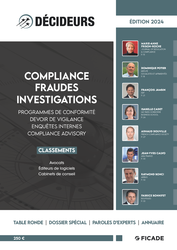
🌐follow Marie-Anne Frison-Roche on LinkedIn
🌐subscribe to the Newsletter MAFR. Regulation, Compliance, Law
🌐subscribe to the Newsletter Surplomb, par MAFR
____
► Full Reference: M.-A. Frison-Roche, "Les droits de la défense sont au bénéfice de tout le monde, y compris de l’entreprise elle-même" (The rights of defence benefit everyone, including the company itself), interview by Chloé Lassel, in Guide Compliance Fraudes Investigations, edition 2024, ed. Décideurs, Oct. 2024, pp.
____
💬read the interview (in French)
🌐its présentation on LinkedIn (in French)
____
► Presentation of this interview by Décideurs juridiques : "Directrice du Journal of Regulation & Compliance (JoRC) et fondatrice de l’École européenne de droit de la régulation et de la compliance, Marie-Anne Frison-Roche revient sur la révolution du droit de la compliance, son articulation avec les enquêtes internes et les droits de la défense, la place que vont y prendre les contrats et l’arbitrage international." ("Marie-Anne Frison-Roche, Director of the Journal of Regulation & Compliance (JoRC) and founder of the European School of Regulatory and Compliance Law, looks back at the revolution in Compliance Law, its relationship with internal investigations and the rights of the defence, and the role that contracts and international arbitration will play in it.
____
► Questions asked, Answers given:
Décideurs. Question : La compliance est au cœur des préoccupations des entreprises depuis plusieurs années. Pouvez-vous expliquer ce que c’est exactement ? (Compliance has been a key concern for companies for several years. Can you explain what it is exactly?)
Marie-Anne Frison-Roche. English summary Answer: 'Compliance' should not be confused with 'Compliance', which I defined in 2016. Compliance Law is an extension of Regulatory Law, by freeing the latter from the existence of a sector as a prerequisite and a regulatory authority as an indicator. Internalised in the company, it manifests itself, for example, in Vigilance mechanisms, which are its cutting edge. Through Compliance, the political authority asks companies to help it achieve "Monumental Goals", as I have suggested, standards in which this new branch of Law is anchored (anti-money laundering, anti-corruption, sustainability, etc.).
D. Q. : Les entreprises doivent désormais être enquêtrices et juges de ce qu’il leur arrive. Voire transmettre aux autorités, lorsqu’il le faut, des informations pouvant les incriminer. Comment concilier ces obligations avec les droits de la défense ? (Companies must now be investigators and judges of what happens to them. When necessary, they can even pass on incriminating information to the authorities. How do you reconcile these obligations with the rights of the defence?)
MaFR. English summary A.: In 2023, I proposed this expression of companies as "prosecutors and judges of themselves", and the place that this should give to the rights of the defence, and in 2024 I will work out the right balance between internal investigations and the rights of the defence. For the moment, this balance has not been achieved.
D. Q. : Dans l’un de vos ouvrages, François Ancel, conseiller à la première chambre civile de la Cour de cassation, écrit que la compliance renouvelle l’office du juge. Comment concilier cette idée avec l’office habituel du juge qui est celui de se prononcer sur des faits avérés et non pas futurs ? (In one of your books, François Ancel, judge in the First Civil Chamber of the French Court of Cassation, writes that Compliance is renewing the role of the judge. How do you reconcile this idea with the judge's usual role, which is to rule on proven facts rather than future ones?)
MaFR. English summary A.: Indeed, In this book La juridictionnalisation de la compliance (Compliance Jurisdictionalisation), he stresses that the role of the civil and commercial courts is being profoundly renewed, in particular because they must deal with what I described in 2021 as "Systemic Litigation" and must rule on the future. From then on, the ordinary courts will take centre stage.
D. Q. : Le recours aux clauses de compliance est-il une solution pour être à la hauteur des ambitions de la compliance et de ses exigences ? (Is the use of compliance clauses a solution for living up to the ambitions and requirements of compliance?)
MaFR. English summary A.: Indeed, in 2022, I developed the concepts of 'Compliance Contract' and 'Compliance clauses', by which companies implement their legal compliance obligations. This gives rise to Regulatory Contracts, particularly in business chains. This gives a great deal of leeway and power, but also Responsibility, to the companies that invent them.
D. Q. : Le recours aux arbitrages doit-il être privilégié ? (D. Q. Should recourse to arbitration be preferred?)
MaFR. English summary A.: It has to be. Because there is a contract. Even though Compliance is closely bound up with the legal obligations and public order, and possibly international public order. Even if this is not yet apparent, Compliance and International Arbitration are natural allies.
________
Sept. 24, 2024
Thesaurus : 02. Cour de cassation
March 5, 2024
Newsletter MAFR - Law, Compliance, Regulation
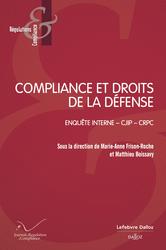
🌐follow Marie-Anne Frison-Roche on LinkedIn
🌐subscribe to the Newsletter MAFR Regulation, Compliance, Law
____
► Full Reference: M.-A. Frison-Roche, Compliance et droits de la défense. Enquête interne - CJIP - CRPC : les lignes de force de l'ouvrage (Compliance and rights of the defence. Internal investigation – French Judicial Public Interest Agreement – French guilty plea procedure : the main themes of the book), Newsletter MAFR Law, Compliance, Regulation, March 5, 2024
____
📧Read by freely subscribing other news of the Newsletter MAFR - Law, Compliance, Regulation
____
🧱Compliance and rights of defense: a book to design them together to improve practices
The book Compliance et droits de la défense (Compliance and rights of the defence), co-published by the Journal of Regulation & Compliance (JoRC ) and Dalloz, takes as its starting point practices ranging from internal investigations to convention judiciaire d’intérêt public - CJIP (Judicial Public Interest Agreement) and comparution sur reconnaissance préalable de culpabilité – CRPC (French guilty plea procedure), to measure the way in which Compliance makes room, or not, for the rights of the defense.
📧read the general presentation of the book and, in a very detailed presentation of the book's main points, the presentation of each of the contributions, published on March 5, 2024 in the Newsletter MAFR - Law, Compliance, Regulation
Feb. 29, 2024
Thesaurus : Doctrine

► Full Reference: M. Boissavy, "Compliance et droits de la défense : toujours pour le respect des droits humains" ("Compliance and the rights of the defence: always in favour of respect for human rights"), in M.-A. Frison-Roche & M. Boissavy (eds.), Compliance et droits de la défense. Enquête interne – CJIP – CRPC, Journal of Regulation & Compliance (JoRC) and Dalloz, coll. "Régulations & Compliance", 2024, pp. 27-32.
____
📕read a general presentation of the book, Compliance et droits de la défense. Enquête interne – CJIP – CRPC, in which this article is published
____
► English Summary of the article (done by the Journal of Regulation & Compliance - JoRC): The author begins by describing Compliance, whereby the company's freedom is curtailed so that its power serves the goals set by the public authorities and prevents risks from occurring. These "Monumental Goals" are set by the public authorities either to prevent the occurrence of systemic risks, or to achieve beneficial objectives for society, human beings and the environment. In order to do this, companies will have to investigate themselves and denounce themselves, with this self-denunciation reducing the criminal penalties incurred as a result of infringements they have uncovered themselves. These surveillance tools facilitate the convention judiciaire d'intérêt public - CJIP (French Judicial Public Interest Agreement) mechanism. They work "for the better" if the aforementioned Monumental Goals are achieved. They work "for the worse", if this is at the cost of sacrificing the rights of the defence.
The second part of the paper recalls the importance of the rights of the defence, their roots in history, and even in Natural Law, their position at the very top of the hierarchy of norms and, according to the author, the integration of the adversarial principle within them, as well as the fact that they apply even outside trials, as has been imposed by case-law in matters of dismissal.
This is why, thirdly, the paper argues that the rights of the defence must always be applied in all compliance mechanisms, even if this does not involve a trial or a sanction in the strict sense of the term, particularly in internal investigations, procedures without a trial which are above all evidentiary mechanisms for the next stage, which is usually judicial. In addition, the author questions the effectiveness of the consents expressed during the CJIP and comparution sur comparution sur reconnaissance préalable de culpabilité - CRPC (French French guilty plea procedure).
____
🦉This article is available in full text to those registered for Professor Marie-Anne Frison-Roche's courses
________
Feb. 29, 2024
Editorial responsibilities : Direction of the collection "Regulations & Compliance", JoRC & Dalloz

🌐follow Marie-Anne Frison-Roche on LinkedIn
🌐subscribe to the Newsletter MAFR Regulation, Compliance, Law
____
► Full Reference: M.-A. Frison-Roche & M. Boissavy (eds.), Compliance et droits de la défense. Enquête interne – CJIP – CRPC (Compliance and rights of the defence. Internal investigation – French Judicial Public Interest Agreement – French guilty plea procedure), Journal of Regulation & Compliance (JoRC) and Dalloz, "Régulations & Compliance" Serie, 2024, 362 p.
____
► General presentation of the book: We do not have an overall view of the relationship between Compliance and the rights of the defence in the continuum of internal investigations and DPA, or in the French legal system the convention judiciaire d'intérêt public (CJIP) and the comparution immédiate avec reconnaissance de culpabilité (CRPC), in particular because the texts, whether hard law or soft law, decisions and academic analyses segment them, making it difficult to build a pertinent appreciation of each one. This is made all the more difficult by the fact that we know little about how each of them is applied in practice, both within each of them and in relation to each other. As a result, it is difficult to express overall satisfaction, or total rejection, or to suggest some specific reforms and to precise on what points, to identify the appropriate source of these improvements, legislation, case law, professions, or spontaneous ways of doing. The first ambition of this book is therefore to restore an overall vision, because this is the vision of practice. If shortcomings are found to exist, then they can be more easily denounced.
However, some of the situations described may be described as flawed, or even dramatic, by some, while others may consider that they should be approved as they stand. This applies, for example, to the question of whether or not the investigation report should be secret from the prosecuting authority, which may propose a DPA (or in the French legal system a CJIP), whether or not this CJIP should be extended to individuals, whether or not a lawyer should be present from the internal investigation stage onwards, whether or not the lawyer should support the interests of the company he/she is investigating and continue to do so before the regulator or the prosecutor, whether or not the investigation is delegated from the public authorities to the company, whether or not the lawyer-investigator and then the lawyer-defendant are both lawyers, whether or not the victims are represented in the the CIPC process, etc. Depending on what one thinks the relation between Compliance and due process should be in principle and in practice, one expresses a more or less approving or severe judgement on the state of the texts, the soft law nature of most of them making the exercise complicated, and then if there is a gap between them and what one thinks should be the right standard, one asserts that in practice things happen differently from what the texts say, or one considers that the texts should be changed. From point to point, a veritable kaleidoscope emerges in this book.
Indeed, the result is a series of contributions that sometimes clash with one another, with a sort of contradictionary principle creeping into the very structure of this book, thus establishing the readesr as a sort of judges themselves , that character who is so absent. He/she will be able to do so, since the book lists texts, describes practices and gives an illustration of everything that can be thought of, in visions that are sometimes analytical and sometimes global, with proposals of reforms of texts, jurisprudence or conduct.
The aim of the book is to enable readers to form their own opinions and to take part in what is undoubtedly being strongly debated today: the confrontation between Compliance and rights of the defence.
____
🧮this book follows a conference organised by the Conseil national des barreaux - CNB (French National Council of Lawyers), which took place on 20 and 21 April 2023: Avocats et droits de la défense dans les enquêtes internes et la justice négociée.
____
This volume is the continuation of the books dedicated to Compliance in this collection.
📚 Read the presentations of the other books on Compliance in this collection:
- further books:
🕴️M.-A. Frison-Roche (ed.), 📕Le système probatoire de la compliance, 2025
🕴️M.-A. Frison-Roche (ed.), 📕Compliance et contrat, 2024
🕴️M.-A. Frison-Roche (ed.), 📕L'Obligation de Compliance, 2024
- previous books:
🕴️M.-A. Frison-Roche (dir.), 📕La juridictionnalisation de la Compliance, 2023
🕴️M.-A. Frison-Roche (ed.), 📕Les Buts Monumentaux de la Compliance, 2022
🕴️M.-A. Frison-Roche (ed.), 📕Les outils de la Compliance, 2021
🕴️M.-A. Frison-Roche (ed.), 📕Pour une Europe de la Compliance, 2019
🕴️N. Borga, N., 🕴️J.-Cl. Marin & 🕴️J.-Ch. Roda (eds.), 📕Compliance : Entreprise, Régulateur, Juge, 2018
🕴️M.-A. Frison-Roche (ed.), 📕Régulation, Supervision, Compliance, 2017
🕴️M.-A. Frison-Roche (ed.), 📕Internet, espace d'interrégulation, 2016
📚Read the presentations of the other titles of the collection.
____
► Summary of the book: The rights of the defence are one of the pillars of our Rule of Law. On the face of it, compliance techniques are not concerned with this under the pretext of efficiency. This would be particularly true in a trilogy that unfolds over time: internal investigation, convention judiciaire d'intérêt public - CJIP (French Judicial Public Interest Agreement) and comparution sur reconnaissance préalable de culpabilité - CRPC (French guilty plea procedure).
However, because Compliance Law is also the expression of the Rule of Law, in that its ambition is to detect and prevent systemic risks in order to protect present and future human beings, we must go beyond this opposition and articulate Compliance and rights of the defence.
The Monumental Goals of Compliance, which justify its power, for example to obtain information, and the fundamental rights of the defence, which for example impose the presumption of innocence, must be adjusted to each other; by interpreting texts, or even adopting new ones.
The book analyses each of these three techniques, in particular the still largely unregulated internal investigation, and sheds light on them in relation to each other, in order to formulate proposals.
____
🏗️General construction of the book: The book opens with an overview divided into three sections. The first Title compares the challenges of the internal investigation with the rights of the defence. The second Title compares the issues at stake in the convention judiciaire d'intérêt public - CJIP (French Judicial Public Interest Agreement) and the comparution sur reconnaissance préalable de culpabilité - CRPC (French guilty plea procedure) with these same rights of the defence.
____
TABLE OF CONTENTS
COMPLIANCE ET DROITS DE LA DÉFENSE : VISION D'ENSEMBLE
(COMPLIANCE AND RIGHTS OF THE DEFENCE : OVERVIEW)
Section 2 ♦️ Compliance et droits de la défense : toujours pour le respect des droits humains (Compliance and rights of the defence: always for the respect of human rights), by🕴️Matthieu Boissavy
Section 3 ♦️ Circuler dans le temps pour mettre en phase Compliance et droits de la défense (Moving through Time to align Compliance and rights of the defence), by🕴️Marie-Anne Frison-Roche
TITRE I.
LES ENJEUX PROCÉDURAUX DE L'ENQUETE INTERNE CONFRONTÉE AUX DROITS DE LA DÉFENSE
(TITLE I.
PROCEDURAL CHALLENGES OF THE INTERNAL INVESTIGATION
IN RELATION TO THE RIGHTS OF THE DEFENCE)
CHAPITRE I : VISION GÉNÉRALE DES DROITS DE LA DÉFENSE DANS L'ENQUÊTE INTERNE
(CHAPTER I: OVERVIEW OF THE RIGHTS OF THE DEFENCE IN INTERNAL INVESTIGATION)
Section 1 ♦️ Approche doctrinale de l’enquête interne et de l’enquête pénale privée (Doctrinal approach to internal investigation and private criminal investigation), by 🕴️Benjamin Fiorini
Section 2 ♦️ Regard critique : La place des droits de la défense dans l'enquête interne selon le guide AFA/PNF (A critical look: The place of the rights of the defence in the internal investigation according to the AFA/PNF Guide), by 🕴️Margaux Durand-Poincloux, 🕴️David Apelbaum and 🕴️Paola Sardi-Antasan
CHAPITRE II : LES DROITS DE LA DÉFENSE À CHAQUE ÉTAPE DE L'ENQUÊTE INTERNE
(CHAPTER II: THE RIGHTS OF THE DEFENCE AT EACH STAGE OF THE INTERNAL INVESTIGATION)
Section 1 ♦️ La réception des alertes par l'avocat (Reception of alerts by the lawyer), by🕴️Maria Lancri
Section 2 ♦️ Collecte et traitement des informations dans les enquêtes internes à l'ère numérique : processus et enjeux (Collecting and processing information for internal investigations in the digital age: processes and challenges), by🕴️Uriel Goldberg
Section 3 ♦️ L’apport de la psychologie pour l'effectivité des droits de la défense dans l'enquête interne pour harcèlement au travail (The contribution of psychology to the effectiveness of the rights of the defence in internal investigation for harassment in the workplace), by🕴️Nathalie Leroy & 🕴️Danièle Zucker
Section 4 ♦️ Le respect des droits de la défense lors des auditions des enquêtes internes : un gage d’efficacité (Respecting the rights of the defence during hearings in internal investigations: a guarantee of efficacy), by 🕴️Emmanuel Daoud & 🕴️Ghita Khalid Rouissi
Section 5 ♦️ L’enquête interne au cœur des enjeux de conformité et de justice négociée : analyse de la position de l'AFA et du PNF (The internal investigation at the heart of conformity and negotiated justice issues: analysis of the position of the AFA and the PNF), by🕴️Éric Russo
Section 6 ♦️ Le rapport d’enquête interne à l’épreuve des droits de la défense (The internal investigation report put to the test of defence rights), by🕴️Samuel Sauphanor
CHAPITRE III : LA SPÉCIFICITÉ DES ENQUÊTES INTERNES DANS LES ENTREPRISES INTERNATIONALES ET LA PLACE DES DROITS DE LA DÉFENSE
(CHAPTER III : SPECIFICITY OF INTERNAL INVESTIGATIONS IN INTERNATIONAL COMPANIES AND THE PLACE OF THE RIGHTS OF THE DEFENCE)
Section 1 ♦️ La spécificité des enquêtes internes pratiquées par les groupes internationaux (Specificity of internal investigations carried out by international groups), by 🕴️Olivier Catherine
Section 2 ♦️ Garantir la valeur probatoire d’un rapport dans le cadre d’une enquête interne opérée dans une entreprise internationale (Guaranteeing the evidential value of a report in an internal investigation carried out in an international company), by 🕴️Monique Figueiredo
Section 3 ♦️ La responsabilité de l'entreprise dans la conception et la menée de l'enquête interne (The company's responsibility in designing and conducting an internal investigation), by 🕴️Lydia Meziani
Section 4 ♦️ Enquêtes internes, enquêtes pénales et droits de la défense : que nous disent les jurisprudences américaine et anglaise (l’affaire Connolly et l’affaire ENRC) ? (Internal investigations, criminal investigations and rights of the defence: what do the US and UK case law tell us (the Connolly case and the ENRC case)?), by 🕴️Victoire Chatelin
CHAPITRE IV : LE RÔLE SINGULIER DE L'AVOCAT DANS L'ENQUÊTE INTERNE
(CHAPTER IV: THE SPECIAL ROLE OF THE LAWYER IN THE INTERNAL INVESTIGATION)
Section 1 ♦️ La méthodologie propre à l'avocat enquêteur (The investigating lawyer's own methodology), by 🕴️William Feugère
Section 2 ♦️ L'enquête interne façonnée par la déontologie de l'avocat (The internal investigation shaped by the lawyer's deontology), by 🕴️Stéphane De Navacelle, 🕴️Julie Zorrila and 🕴️Laura Ragazzi
Section 3 ♦️ Préserver le secret professionnel de l'avocat dans l'enquête interne et son résultat (Preserving the lawyer's professional secrecy in the internal investigation and its outcome), by 🕴️Bénédicte Graulle & 🕴️Yanis Rahim
Section 4 ♦️ L’avocat-enquêteur en droit du travail : un janséniste au milieu du Far West (The lawyer-investigator in employment law: a Jansenist in the Wild West), by 🕴️Richard Doudet
Section 5 ♦️ La défense des personnes physiques dans les enquêtes internes (Defending individuals in internal investigations), by 🕴️Dorothée Hever
TITRE II.
LES ENJEUX PROCÉDURAUX DE LA CJIP ET DE LA CRPC
CONFRONTÉES AUX DROITS DE LA DÉFENSE
(TITLE II.
PROCEDURAL CHALLENGES OF THE FRENCH JUDICIAL PUBLIC INTEREST AGREEMENT
AND THE FRENCH GUILTY PLEA PROCEDURE
IN RELATION TO THE RIGHTS OF THE DEFENCE)
CHAPITRE I : VISION GÉNÉRALE DES DROITS DE LA DÉFENSE DANS LA CJIP ET LA CRPC
(CHAPTER I: OVERVIEW OF THE RIGHTS OF THE DEFENCE IN THE FRENCH JUDICIAL PUBLIC INTEREST AGREEMENT AND THE FRENCH GUILTY PLEA PROCEDURE)
Section 1 ♦️ Théorie et pratique de la négociation dans la justice pénale (Theory and practice of negotiation in criminal justice), by 🕴️Sarah-Marie Cabon
Section 2 ♦️ La lutte anti-corruption : l’emprunt au modèle américain et à ses récentes évolutions (The fight against corruption: borrowing from the American model and its recent developments), by 🕴️Stephen L. Dreyfuss
Section 3 ♦️ Justice pénale négociée : avantages présents, risques à venir (Negotiated criminal justice: curent benefits, future risks), by 🕴️Alexis Bavitot
CHAPITRE II : FORMES ACTIVES DES DROITS DE LA DÉFENSE, LES DIALOGUES À L'OEUVRE OU À PARFAIRE DANS LA CJIP ET LA CRPC
(CHAPTER II: ACTIVE FORMS OF THE RIGHTS OF THE DEFENCE, DIALOGUES AT WORK OR TO BE PERFECTED IN THE FRENCH JUDICIAL PUBLIC INTEREST AGREEMENT AND THE FRENCH GUILTY PLEA PROCEDURE)
Section 1 ♦️ Combinaison des CRPC et des CJIP : le cas particulier des affaires de fraude fiscale (Combination of the French guilty plea procedure and the French Judicial Public Interest Agreement: the special issue of tax fraud cases), by 🕴️Marion David
Section 2 ♦️ Pour une justice pénale négociée plus équitable (For a fairer negotiated criminal justice), by🕴️Astrid Mignon Colombet
Section 3 ♦️ Les impacts, sur les droits de la défense, des disparités de la justice pénale négociée dans l’Union européenne (The impact on the rights of the defence of the disparities in negotiated criminal justice in the European Union), by 🕴️Emmanuel Moyne
Section 4 ♦️ L'évolution des rapports entre avocats et autorités de poursuites depuis l'introduction de la CJIP (Developments in relations between lawyers and prosecuting authorities since the introduction of the French Judicial Public Interest Agreement), by 🕴️Thomas Baudesson
CHAPITRE III : LE RÔLE SINGULIER DE L'AVOCAT DANS LA CJIP ET LA CRPC
(CHAPTER III: THE SINGULAR ROLE OF THE LAWYER IN THE FRENCH JUDICIAL PUBLIC INTEREST AGREEMENT AND THE FRENCH GUILTY PLEA PROCEDURE)
Section 1 ♦️ Quand se justifie et quand s'arrête la collaboration ? À propos de la CJIP (When is collaboration justified and when does it end? About the French Judicial Public Interest Agreement), by 🕴️Philippe Goossens
Section 2 ♦️ Le dialogue de l’avocat et de son client, chef d’entreprise, face à la proposition d’une CRPC et d’une CJIP (The dialogue between the lawyer and his client, a company director, faced with the proposal of a French guilty plea procedure or a French Judicial Public Interest Agreement), by 🕴️François Saint-Pierre
Section 3 ♦️ Le dilemme de l'avocat pénaliste face à la CRPC (The criminal lawyer's dilemma when faced with the French guilty plea procedure), by 🕴️Jean Boudot
Section 5 ♦️ Défendre les intérêts des victimes dans la justice pénale économique négociée (Defending victims' interests in negotiated economic criminal justice), by 🕴️Jérôme Karsenti
________
Feb. 15, 2024
Publications

🌐follow Marie-Anne Frison-Roche on LinkedIn
🌐subscribe to the Newsletter MAFR Regulation, Compliance, Law
____
► Full Reference: M.-A. Frison-Roche, "Adjusting General Procedural Law to Compliance Law by the Nature of things", in M.-A. Frison-Roche (ed.), Compliance Jurisdictionalisation, Journal of Regulation & Compliance (JoRC) and Bruylant, "Compliance & Regulation" Serie, 2024, pp. 273-28.
____
📝read the article
____
🚧read the bilingual Working Paper which is the basis of this article, with additional developments, technical references and hyperlinks
____
📘read a general presentation of the book, Compliance Jurisdictionalisation, in which this article is published
____
The principal elements of this articles had been presented during the scientific manifestation held on September 23, 2021, at Dauphine University in Paris, coorganised by the Journal of Regulation & Compliance (JoRC) and the Institute Droit Dauphine.
In the book this article is placed in the chapter II about the General Procedural Law in the Compliance Law.
____
► Summary of the article (done by the Journal of regulation & Compliance - JoRC): General Procedural Law is an invention, essentially due to Professor Motulsky, going well beyond the gain that one always has in comparing types of procedures with each other. As he asserted, there is Natural Law in General Procedural Law, in that as soon as there is the Rule of Law Principle there cannot be, whatever the "procedure", even the "process", such and such way of doing things: for example, to decide, to seize the one who decides, to listen before deciding, to contest the one who has decided.
General Procedural Law therefore depends on the nature of things. However, Compliance Law organizes things in a new way. Therefore, both the simple and iron principles of General Procedural Law creep in where we do not expect them at first sight, because there is no judge, this character around whom ordinary procedures fit together. The principles of General Procedural Law are essential in companies. Even if the regulations do not breathe a word about it, it is up to the Judges, in particular the Supreme Courts, to recognize this nature of things because on this effect of nature that General Procedural Law is built: when compliance mechanisms oblige companies to strike, General Procedural law must oblige, even in the silence of the texts, to arm those who can be hit, even stand up against devices that would set aside too much these defenses that are easily considered contrary to efficiency (I).
But because it is a question of making room for this nature of the things of which the Rule of Law Principle entrusts the custody to the Judge and the Lawyer, the General Procedural Law must also adjust itself to what the extraordinary new branch of Law Compliance Law is. Indeed, Compliance Law is extraordinary in that it expresses the political pretention to act now so that the future will not be catastrophic, by detecting and preventing the realization of systemic risks, or even that it is better, by building effective equality or real concern for others. Because it is the Monumental Goals that defines this new branch of Law, a disputed systemic issue, possibly disputed by several parties before a judge, the procedural principles used by the court must be broadened considerably: they must then include civil society and the future (II).
General Procedural Law thus naturally acquires an even more place than in the classic branches of Law since on the one hand it imposes itself outside of trials, particularly in companies and on the other before the courts it involves people who had hardly any place to speak and thinks themselves, especially the systems entering the "causes" of Compliance now debated before the Judge.
________
Jan. 17, 2024
Thesaurus : Doctrine

► Référence complète : J.-F. Bohnert, "Les conditions de réussite de l'enquête interne dans les rapports entre le Parquet national financier et l’entreprise mise en cause – l’enquête interne au soutien de la défense de l’entreprise", in M.-A. Frison-Roche et M. Boissavy (dir.), Compliance et droits de la défense. Enquête interne – CJIP – CRPC, Journal of Regulation & Compliance (JoRC) et Dalloz, coll. "Régulations & Compliance", à paraître.
____
📕consulter une présentation générale de l'ouvrage, Compliance et droits de la défense - Enquête interne, CIIP, CRPC, dans lequel cet article est publié
____
► Résumé de l'article (fait par le Journal of Regulation & Compliance - JoRC) : Dans sa contribution, le procureur national financier rappelle qu'il s'est exprimé sur sa conception des enquêtes internes dans des lignes directrices et guide, document qui ne "décrivent une pratique et répondent à des objectifs de transparence et de prévisibilité pour le public et les acteurs économiques". Il estime qu'une entreprise confrontée à une suspicion d'infraction doit arbitrer sur l'opportunité de lancer une enquête interne, afin notamment de se réorganiser. Si cette démarche contribue à la manifestation de la vérité, elle sera valorisé dans les éventuelles procédures ultérieures.
Il faut que les conditions et procédures de l'enquête soient satisfaisantes, notamment dans la recueil des informations, les garanties procédurales offertes aux personnes, la rédaction du rapport d'enquêtes. Si celui-ci révèle des "comportements non conformes aux procédures établies en interne", l'entreprise pourra en tirer les conséquences judiciaires et/ou disciplinaires. L'auteur souligne que l'analyse doit être menée indépendamment de l'écriture du rapport pour ne pas biaiser la présentation des faits.
Il est rappelé que les lignes directrices invitent l'entreprise à informer spontanément le PNF des faits révélés par l'enquête, ce qui permet ainsi à l'entreprise à prétendre à une "réponse pénale négociée et adoucie" en raison de cette "attitude de coopération et de bonne foi" et du "sérieux" des investigations menées, tandis que le PNF mène une enquête pénale. Le PNF pourra d'ailleurs demander à avoir communication des rapports d'exécution, lettres de mission, etc., de l'enquête interne. En revanche, une enquête interne "défensive", par exemple ouverte après l'ouverte de l'enquête pénale, pourrait être contreproductive. Une collaboration peut à l'inverse s'instaurer, le PNF pouvant propose un document de cadrage d'une enquête interne, un calendrier, etc. , ce qui peut se traduire par des liens continus entre le PNF et l'entreprise tout au long de l'enquête interne. Le PNF considère que si des avocats interviennent dans ce cadre, ils devront être différents de ceux qui interviennent dans l'instance pénale, parallèle ou ultérieure.
____
🦉Cet article est accessible en texte intégral pour les personnes inscrites aux enseignements de la Professeure Marie-Anne Frison-Roche
________
Jan. 17, 2024
Thesaurus : Doctrine

► Référence complète : S. Sauphanor, "Le rapport d’enquête interne à l’épreuve des droits de la défense", in M.-A. Frison-Roche et M. Boissavy (dir.), Compliance et droits de la défense. Enquête interne – CJIP – CRPC, Journal of Regulation & Compliance (JoRC) et Dalloz, coll. "Régulations & Compliance", à paraître.
____
📕consulter une présentation générale de l'ouvrage, Compliance et droits de la défense - Enquête interne, CIIP, CRPC, dans lequel cet article est publié
____
► Résumé de l'article (fait par le Journal of Regulation & Compliance - JoRC) : Pour l'auteur, l'enquête interne constitue encore un "immense angle mort". C'est pourtant un sujet essentiel en ce que pour elle constitue une procédure para-pénale et peut avoir pour effet de déboucher sur une sanction pénale. Les principes de la procédure pénale devraient donc y être pleinement appliqués. Cela n'est pas le cas.
L'auteur pose tout d'abord que l'enquête cristallise un déséquilibre, qui ne peut que se sédimenter par la suite, entre ceux qui mènent l'enquête et ceux qui doivent collaborer, constituant donc un dysfonctionnement intrinsèque, les droits de la défense étant peu présent au cours des investigations, ce qui se cristallise dans le rapport, entravant la défense des personnes mises en cause.
Mais parce que le rapport d'enquête n'est pas le recueil de la vérité mais constitue plutôt la pièce probatoire majeure d'un mécanisme plus vaste, par exemple la perspective d'une CJIP, les personnes mises en cause, morales mais aussi physiques, doivent le penser comme un élément de défense, devant avoir été constitué loyalement, une annulation devant être possible dans le cas contraire, pouvant prouver les diligences des uns et des autres, dans une stratégie anticipée de défense pensée notamment par la personne morale exposée par la suite à des sanctions, avec le risque qu'elle sacrifie l'intérêt propre de collaborateurs.
Il en résulte un rôle difficile pour l'avocat du commanditaire du rapport d'enquête, qui doit discerner quels intérêts défendre et comment le faire. De la même façon, la défense du secret des communications avec son client est difficile à revendiquer à propos du rapport d'enquête puisque celui-ci doit être conçu comme une pièce probatoire destinée à être produite, l'auteur estimant au contraire qu'elle doit être dès le départ conçue comme ne devant pas être secrète mais ayant vocation à être communiqué aux autorités et dans des procédures ultérieures.
____
🦉Cet article est accessible en texte intégral pour les personnes inscrites aux enseignements de la Professeure Marie-Anne Frison-Roche
________
Dec. 10, 2023
Newsletter MAFR - Law, Compliance, Regulation

🌐follow Marie-Anne Frison-Roche on LinkedIn
🌐subscribe to the Newsletter MAFR Regulation, Compliance, Law
____
► Full Reference: M.-A. Frison-Roche, "Comment articuler Compliance et droits de la défense ?" ("How to articulate Compliance and rights of the defence"), Newsletter MAFR Law, Compliance, Regulation, December 10, 2023
____
📧Read by freely subscribing other news of the Newsletter MAFR - Law, Compliance, Regulation
____
🧱Acknowledging their specific characteristics to better articulate Compliance and the rights of the defence
The book, Compliance et droits de la défense (Compliance and the rights of the defence), co-edited by the Journal of Regulation & Compliance (JoRC) and Dalloz, deals with their relationship per se, a relationship illustrated by the internal investigation, the CJIP and the CRPC. Its aim is to explain what Compliance Law is and what the rights of the defence are, in order to find better ways of articulating them: sometimes to rank them, more often to find their points of contact and increase them. Above all, the starting point must be practice.
____
📧read the article published on 10 December 2023 on this topic in the Newsletter MAFR - Law, Compliance, Regulation ⤵️
Nov. 9, 2023
Publications

🌐follow Marie-Anne Frison-Roche on LinkedIn
🌐subscribe to the Newsletter MAFR Regulation, Compliance, Law
____
► Full Reference: M.-A. Frison-Roche, "Reinforce the Judge and the Lawyer to impose Compliance Law as a characteristic of the Rule of Law", in M.-A. Frison-Roche (ed.), Compliance Jurisdictionalisation, Journal of Regulation & Compliance (JoRC) and Bruylant, "Compliance & Regulation" Serie, 2024, pp. 39-65
____
📝read the article
____
🚧read the bilingual Working Paper which is the basis of this article, with additional developments, technical references and hyperlinks
____
📘read a general presentation of the book, Compliance Jurisdictionalisation, in which this article is published
____
► This article is the introduction of the book.
► Summary of the article (done by the Journal of Regulation & Compliance): One can understand that the compliance mechanisms are presented with hostility because they seem designed to keep the judge away, whereas there is no Rule of Law without a judge. Solid arguments present compliance techniques as converging towards the uselessness of the judge (I). Certainly, we come across magistrates, and of all kinds, and powerful ones, but that would be a sign of imperfection: its ex-ante logic has been deployed in all its effectiveness, the judge would no longer be required... And the lawyer would disappear so with him...
This perspective of a world without a judge, without a lawyer and ultimately without Law, where algorithms could organize through multiple processes in Ex Ante the obedience of everyone, the "conformity" of all our behaviors with all the regulatory mass that is applicable to us, supposes that this new branch of Law would be defined as the concentration of processes which gives full effectiveness to all the rules, regardless of their content. But supposing that this engineer's dream is even achievable, it is not possible in a democratic and free world to do without judges and lawyers.
Therefore, it is imperative to recognize their contributions to Compliance Law, related and invaluable contributions (II).
First of all, because a pure Ex Ante never existed and even in the time of the Chinese legists📎!footnote-2689, people were still needed to interpret the regulations because a legal order must always be interpreted Ex Post by who must in any case answer the questions posed by the subjects of law, as soon as the political system admits to attributing to them the right to make claims before the Judge. Secondly the Attorney, whose office, although articulated with the Judge's office, is distinct from the latter, both more restricted and broader since he must appear in all cases where the judicial figure puts himself in square, outside the courts. However, Compliance Law has multiplied this since not only, extending Regulatory Law, it entrusts numerous powers to the administrative authorities, but it also transforms companies into judges, in respect of which the attorneys must deal with.
Even more so, Compliance Law only takes its sense from its Monumental Goals📎!footnote-2690. It is in this that this branch of the Law preserves the freedom of human beings, in the digital space where the techniques of compliance protect them from the power of companies by the way that the Compliance Law forces these companies to use their power to protect people. However, firstly, it is the Judges who, in their diversity📎!footnote-2691, impose as a reference the protection of human beings, either as a limit to the power of compliance tools📎!footnote-2692 or as their very purpose. Secondly, the Attorney, again distinguishing himself from the Judge, if necessary, reminds us that all the parties whose interests are involved must be taken into consideration. In an ever more flexible, soft and dialogical Law, everyone presenting himself as the "advocate" of such and such a monumental goal: the Attorney is legitimate to be the first to occupy this place.
________
Sept. 28, 2023
Thesaurus : 01. Conseil constitutionnel
► Référence complète : Conseil constitutionnel, 28 septembre 2023, n° 2023-1062 QPC
____
________
June 14, 2023
Conferences
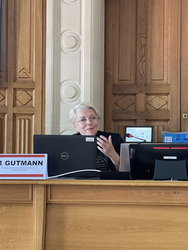
♾️follow Marie-Anne Frison-Roche on LinkedIn
♾️subscribe to the Newsletter MAFR Regulation, Compliance, Law
____
► Full Reference: M.-A. Frison-Roche, "Compliance et droit processuel" ("Compliance and Procedural Law"), in B. Deffains, M.-A. Frison-Roche and J.-B. Racine (dir.), Journal of Regulation & Compliance (JoRC) and University Panthéon-Assas (Paris II), Compliance : Obligation, devoir, pouvoir, culture (Compliance : obligation, duty, power, culture), University Panthéon-Assas, Salle des Conseils, 14 June 2023.
____
🧮See the full programme of this event
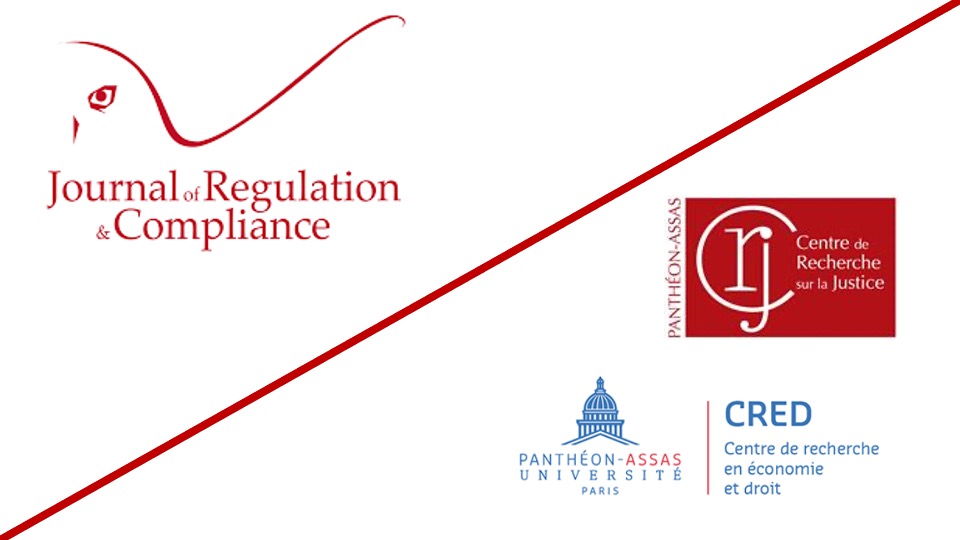
____
🎤see the other speech made during the first day of this symposium : "L'obligation de compliance, entre volonté et consentement : obligation sur obligation vaut" ("Compliance Obligation, between will and consent: obligation on obligation works")
____
► Summary of the conference: After referring to the chapter in the book Compliance Jurisdictionalisation, which deals more specifically with Procedural Law
The first development relates to the fact that the relationship between Compliance Law and Procedural Law is very difficult because it is often said that they simply have nothing to do with each other, or that they have everything to dislike each other. This is because Compliance is often reduced to processes, and to the mechanical place that algorithms could take in it, in taking care of everything.
Compliance would even have the purpose and effect of ensuring that the company and its managers never come into contact with a judge, the public prosecutor being their best ally in this respect.
Secondly, I recalled the very common idea that Procedural Law is a kind of 'tribute' that the rule of Law demands, which certainly weighs down companies when compared with companies living in systems in which there's not not such a price.
But many stress that Procedural Law could become a model. This can be justified and technically anticipated because it has already happened in Regulation Law, and Compliance Law is the deployment of it
In the third stage, I worked on the alliance between the two, with the procedure (rather than the process) modifying compliance and thereby reinforcing it, evoking the way in which this can manifest itself technically
In the fourth step, I looked for what would be the "naturally appropriate procedure" for Compliance: one that takes into account the duration and the development of "solutions", to which the notion of "sustainability", which is central in the substantive Law of Compliance, refers.
In a fifth stage, and devoting more time to this, I have pointed out where innovation should be the strongest: the proof, the probatory obligation being the "part totale" ("total part") of the compliance obligation. This major issue will be the subject of a series of symposiums held in 2024.
________
See the articles that are part of the Second chapter of the book 🕴️M.-A. Frison-Roche (ed.), 📘Compliance jurisdictionalisation, 2023 :
- 🕴️N. Cayrol, 📝General Procedural Law in Compliance Law,
- 🕴️F. Ancel, 📝The procedural principle of compliance, a new trial leading principle?,
- 🕴️B. Sillaman, 📝Privilege and Cooperation: Procedural Lessons Learned from the U.S. for Global Application,
- 🕴️A. Linden, 📝Motivation and publicity of the decisions of the restricted committee of the French Personal Data Protection Commission (Commission nationale de l'informatique et des libertés-CNIL) in a compliance perspective,
- 🕴️S. Scemla and 🕴️D. Paillot, 📝The supervisory Authorities face difficulties to apprehend the Rights of the Defense,
- 🕴️M.-A. Frison-Roche, 📝Adjusting by the nature of things General Procedural Law to Compliance Law.
🕴️M.-A. Frison-Roche, 🚧From Regulation Law to Compliance Law, 2017.
🕴️M.-A. Frison-Roche, 🎤Le rôle du Juge dans le déploiement du Droit de la Régulation en Droit de la Compliance (The role of the Judge in the deployment of Regulatory Law in Compliance Law), in 🧮De la Régulation à la Compliance : quel rôle pour le Juge ?, 2023.
Notably in this perspective, 🕴️M.-A. Frison-Roche and 🕴️M. Boissavy, 📕Compliance et droits de la défense. Enquête interne - CJIP - CRPC (Compliance and Due Process. Internal Investigation - DPA), 2024.
April 25, 2023
Interviews
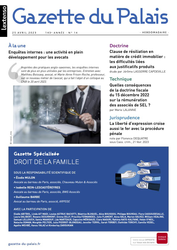
♾️follow Marie-Anne Frison-Roche on LinkedIn
♾️subscribe to the Newsletter MAFR Regulation, Compliance, Law
____
► Full Reference: M.-A. Frison-Roche & M. Boissavy, "Enquêtes internes : une activité en plein développement pour les avocats" ("Internal investigations: a growing business for attorneys"), interview with Miren Lartigue, Gazette du Palais, 25 April 2023.
____
💬read the interview (in French)
____
► Presentation of the interview by the journal (in French): "Inspirées des Anglo-saxons et boostées par la loi Sapin II du 9 décembre 2016, les enquêtes internes sont de plus en plus utilisées par les entreprises françaises pour vérifier la réalité de pratiques douteuses en leur sein, découvertes ou alléguées. Parce qu’il s’agit d’un nouveau champ d’activité pour les avocats, le Conseil national des barreaux (CNB) y a consacré une journée lors de son colloque organisé les 20 et 21 avril 2023 sur le thème « Avocat et droits de la défense dans les enquêtes internes et la justice négociée », qui a réuni 750 participants sur deux jours. Matthieu Boissavy et Marie-Anne Frison-Roche, qui ont participé à l’organisation de cet évènement, nous expliquent les contours de ce nouveau métier."
____
► Questions asked (in French):
- Quels sont la place et le rôle de l’avocat dans les enquêtes internes et pourquoi le CNB a-t-il souhaité organiser une journée consacrée à ce sujet ?
- Quel est leur rôle dans la réception des alertes ?
- Et dans l’enquête interne proprement dite ?
- Quelle est la complémentarité de l’avocat avec le juriste interne ?
- Quels sont outils utilisés pour le calcul des préjudices, la collecte et le traitement des données ?
- Comment s’applique la déontologie de l’avocat ?
- Et qu’en est-il des droits de la défense ?
- Quelle est l’étendue du secret professionnel de l’avocat ?
________
April 24, 2023
Thesaurus : Autorité des Marchés Financiers (A.M.F.)
Référence complète : AMF, Com. sanctions, Décision n° 4 du 24 avril 2023, Melanion Capital
____
_____
April 20, 2023
Conferences
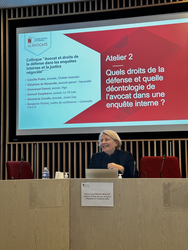
♾️ suivre Marie-Anne Frison-Roche sur LinkedIn
♾️s'abonner à la Newsletter MAFR Regulation, Compliance, Law
____
► Référence complète : M.-A. Frison-Roche, synthèses de chacune des 8 tables-rondes et synthèse finale, in Conseil National des Barreaux (CNB), L'avocat et les droits de la défense dans les enquêtes internes et la justice négociée, Paris, 20 et 21 avril 2023.
____
🧮Consulter le programme complet de cette manifestation
🧮Retrouver le programme dans lequel les vidéos sont insérées
📕Consulter une première présentation de l'ouvrage dirigé par Marie-Anne Frison-Roche et Matthieu Boissavy.
____
Dans la journée du 20 avril 2023
consacrée plus particulièrement aux enquêtes internes
🎥regarder le film de la première session, ayant pour thème : Des avocats dans les enquêtes internes : pourquoi, avec qui et avec quels outils ? cliquer ICI
____
🎥regarder le film de la deuxième session, ayant pour thème : Quels droits de la défense et quelle déontologie de l'avocat dans une enquête interne ? cliquer ICI
____
🎥regarder le film de la troisième session, ayant pour thème : Les enquêtes internes en matière sociale : cliquer ICI
____
🎥regarder le film de la quatrième session, ayant pour thème : Les enquêtes internes dans la lutte anti-corruption et pour le respect du devoir de vigilance : cliquer ICI (la synthèse porta à la fois sur cette 4ième session et sur l'ensemble de la journée)
________
Dans la journée du 21 avril 2023
consacrée plus particulièrement à la CJIP et à la CRPC
🎥regarder le film de la première session, ayant pour thème : Théorie et pratique de la négociation dans la justice pénale cliquer ICI
____
🎥regarder le film de la deuxième session, ayant pour thème : Le rôle du juge, du procureur, du justiciable et de l'avocat dans une CRPC et une CJIP cliquer ICI
____
🎥regarder le film de la troisième session, ayant pour thème : Combinaison des CRPC et des CJIP : enjeux, défis et perspectives cliquer ICI
____
🎥regarder le film de la quatrième session, ayant pour thème : Analyse comparative internationale de la justice négociée et prospective cliquer ICI
____
🎥regarder le film de la troisième session, ayant pour thème : Combinaison des CRPC et des CJIP : enjeux, défis et perspectives cliquer ICI
____
April 6, 2023
Interviews

♾️follow Marie-Anne Frison-Roche on LinkedIn
♾️subscribe to the Newsletter MAFR Regulation, Compliance, Law
____
► Full Reference: M.-A. Frison-Roche & M. Boissavy, "Avocat et droits de la défense dans les enquêtes internes et la justice négociée" ("Attorneys and rights of the defence in internal investigations and negociated justice"), interview with Marina Brillié-Champaux, Dalloz Actu Étudiant, 6 April 2023.
____
💬read the interview (in French)
____
► Presentation of the interview by the journal (in French): "Futurs avocats, c’est à vous que s’adresse cette interview de Marie-Anne Frison-Roche, agrégée des Facultés de Droit, directrice du Journal of Regulation & Compliance (JoRC) et de Matthieu Boissavy, avocat aux barreaux de Paris et de New York, médiateur, membre du Conseil National des Barreaux, vice-président de la commission Libertés et droits de l’Homme. Les 20 et 21 avril 2023 le Conseil national des barreaux, sous l’impulsion de ses commissions Libertés et droits de l’Homme et Droit et Entreprise, organise un colloque sur le thème « Avocat et droits de la défense dans les enquêtes internes et la justice négociée ». Si vous êtes déjà dans la profession, il se peut que leurs réponses vous intéressent pour le respect du droit à la justice !"
____
► Questions asked (in French):
- En quoi consistent les enquêtes internes ?
- Qu’appelle-t-on la justice négociée ?
- Qu’attendez-vous de ce colloque ?
Le questionnaire de Désiré Dalloz
- Quel est votre meilleur souvenir d’étudiant ?
- Quels sont votre héros et votre héroïne de fiction préférés ?
- Quel est votre droit de l’Homme préféré ?
________